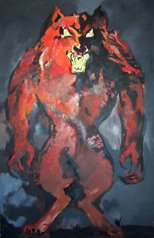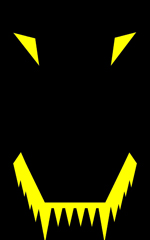
Photo with Sumya, Chinggis Khaan, Cleidi, and Odbaatar in the History Museum
Bonjour. Some notes since arriving back in Mongolia in February:
In June, an immigration official looked me in the eye and told me that he was going to deport me. That was the climax of a month-long saga involving deceit, corruption, and the midnight train to China. I'm still here, of course.
In July, I bought an apartment in downtown Ulaanbaatar (top floor, south facing, balcony, just set back from Peace Avenue), and I established my Mongolian company: Radigan Co., Ltd.
Also in July, I fell off a horse at a full gallop jumping over a hole and busted my collarbone. After a 15k ride back to the ger, plenty of vodka, and a three-hour drive back to UB, I had surgery and they inserted steel pins to hold the bone together while it heals.
In August, I visited the central prison for the first time with my friend Martin. Martin is an Australian immigration lawyer, among other things. Last year, he was wrongfully incarcerated at the prison. He didn't eat or drink as a hunger strike until they let him out, which they did after a week when a doctor pronounced he was a day away from death. While in the prison, Martin learned that it has no running water. The prison is an old Red Army barracks complex that was converted after the collapse of the Soviet Union. The Russians didn't put in any plumbing when they built the place some thirty years ago. Water is delivered by tanker truck and parceled out to the prisoners in plastic bags; the bucket in each cell is emptied out the window. After Martin got out, he set about raising funds and getting equipment-time donated, mainly from Australian and other foreign mining companies in Mongolia, and he has now drilled a well and built a main into the prison. The project is set to be completed this month; it needs to be completed before the winter. The first snowfall was September 16th.
In June, an immigration official looked me in the eye and told me that he was going to deport me. That was the climax of a month-long saga involving deceit, corruption, and the midnight train to China. I'm still here, of course.
In July, I bought an apartment in downtown Ulaanbaatar (top floor, south facing, balcony, just set back from Peace Avenue), and I established my Mongolian company: Radigan Co., Ltd.
Also in July, I fell off a horse at a full gallop jumping over a hole and busted my collarbone. After a 15k ride back to the ger, plenty of vodka, and a three-hour drive back to UB, I had surgery and they inserted steel pins to hold the bone together while it heals.
In August, I visited the central prison for the first time with my friend Martin. Martin is an Australian immigration lawyer, among other things. Last year, he was wrongfully incarcerated at the prison. He didn't eat or drink as a hunger strike until they let him out, which they did after a week when a doctor pronounced he was a day away from death. While in the prison, Martin learned that it has no running water. The prison is an old Red Army barracks complex that was converted after the collapse of the Soviet Union. The Russians didn't put in any plumbing when they built the place some thirty years ago. Water is delivered by tanker truck and parceled out to the prisoners in plastic bags; the bucket in each cell is emptied out the window. After Martin got out, he set about raising funds and getting equipment-time donated, mainly from Australian and other foreign mining companies in Mongolia, and he has now drilled a well and built a main into the prison. The project is set to be completed this month; it needs to be completed before the winter. The first snowfall was September 16th.





